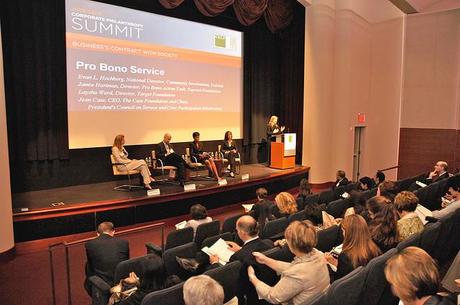
Case Foundation CEO Jean Case participates in a Pro Bono Service panel at the 2008 CECP Corporate Philanthropy Summit. (Photo: Case Foundation via Flickr)
When most people hear the term Corporate Social Responsibility (CSR), they usually picture cheesy, Orwellian subway ads by oil companies or glossy brochures with pictures of African children and their new soccer balls. Corporate volunteerism is a recent trend that belies the image those ads present.
The perception that CSR is only for public relations has grown in part by the notion that social responsibility will always be a superficial, secondary concern so long as a firm’s bottom line trumps concerns of community engagement. In the last decade, as CSR has matured from strict philanthropy to more integrated and thoughtful approaches, companies’ concern for the social and physical environment in which they operate is no longer detached from profit margins.
Enter international corporate volunteerism, showcased last week at CDC Development Solutions’ International Corporate Volunteerism Workshop. There are many different models for corporations to follow, but most involve groups of 6-10 employees traveling together to a developing country to tackle a specific problem or project (infrastructure, IT, supply-chain, management, etc.) for a local nonprofit, business or association.
In these cases, employee skill-development is one of the central takeaways as crops of engineers or marketers who’ve likely never met but work on similar issues for the same company, come together as part of one team focused on the same goal. Multinationals with subsidiaries all over the world also benefit from knowledge exchange through corporate volunteering—not only from North to South but from South to South—as volunteer group members from local offices contribute to projects in their own countries.
As Intel has shown, donating laptops to needy students around the world doesn’t just provide local benefits, it yields tangible research and development outputs as well. This is so because as the next generation of Kenyans learn to incorporate the internet into their education, Intel workers get a first-hand glimpse of how its technology is employed in new markets. Volunteers gain fresh insights into user preferences and can then transmit them back to improve marketing and project design.
For a company like Dow Corning—a leading silicones supplier with 25,000 customers worldwide—it isn’t always easy to see who buys and uses goods containing your products. Through its citizen service corps, employees are able to overcome this knowledge gap. Innovations gleaned through Dow Corning’s volunteer program have already led to the development of several new products.
As multinationals look to expand into emerging and developing economies throughout the world, corporate volunteerism offers an undeniable opportunity for cutting edge market research. Rather than sitting in an office in corporate headquarters, employees are out in the field learning about ways to introduce and refine their products in markets whose dynamics have long been unknown, all the while doing good for communities and NGOs along the way.
Companies striving to do good while also doing well may have stumbled upon a promising model in corporate volunteerism. As it expands into a more pervasive and established CSR tool, corporate volunteering should make sure it doesn’t lose its vision along the way.

